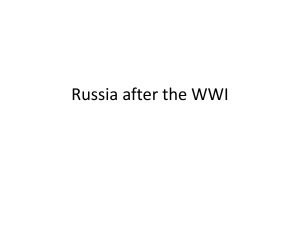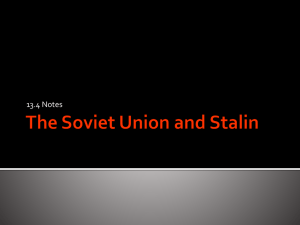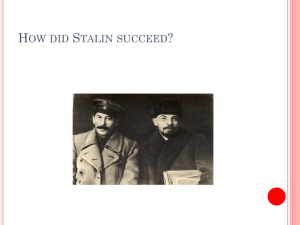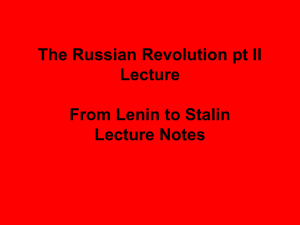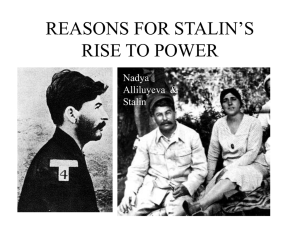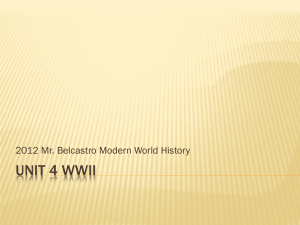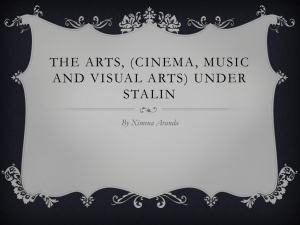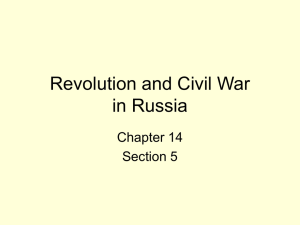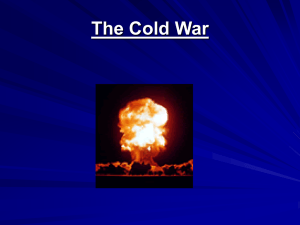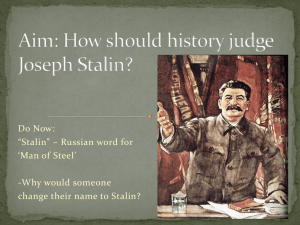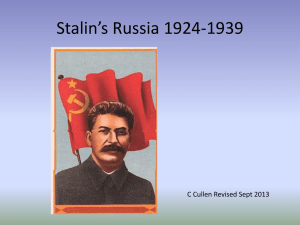Ideology & Nature of the state 2014
advertisement
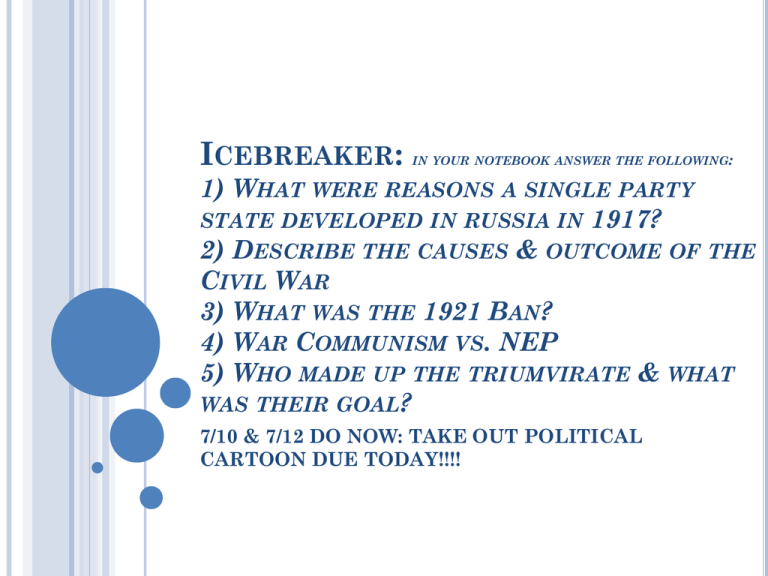
ICEBREAKER: IN YOUR NOTEBOOK ANSWER THE FOLLOWING: 1) WHAT WERE REASONS A SINGLE PARTY STATE DEVELOPED IN RUSSIA IN 1917? 2) DESCRIBE THE CAUSES & OUTCOME OF THE CIVIL WAR 3) WHAT WAS THE 1921 BAN? 4) WAR COMMUNISM VS. NEP 5) WHO MADE UP THE TRIUMVIRATE & WHAT WAS THEIR GOAL? 7/10 & 7/12 DO NOW: TAKE OUT POLITICAL CARTOON DUE TODAY!!!! ICEBREAKER 1) What were reasons a single party state developed in Russia in 1917? Czarist Russia, WWI, Bolshevik Revolution, Civil War 2) Describe the causes & outcome of the Civil War Red Army vs. White Army – Kronstadt Rebellion – 3) What was the 1921 Ban? Ban on all political parties within the communist party (factions) 4) War Communism vs. NEP Total control vs. Some private ownership 5) Who made up the triumvirate & what was their goal? Zinoviev, Kamenev, & Stalin form a triumvirate (alliance) to prevent Trotsky from obtaining majority support WHAT WERE THE KEY STAGES OF THE POWER STRUGGLE Stage 1: Early Moves against Trotsky, 1923 – 1924 April 1923 12th Congress meeting mentioned Lenin & Trotsky but hardly mentioned Stalin = Stalin not important Lenin absent from meetings due to illness = Stalin replaces Trotsky’s supporters in a new enlarged Central Committee (Communist Party’s ruling body between Congress) As General Secretary Stalin replaces Trotsky’s supporters with those who were loyal to him Trotsky was absent at Lenin’s funeral saying that Stalin had told him the wrong date Stalin raises suspicions about Trotsky’s absence and loyalty WHAT WERE THE KEY STAGES OF THE POWER STRUGGLE Stage 2: Defeat of the Left Opposition,1924 – 1927 Stalin continued to dismiss oppositionist from responsibility Position was threatened when in May 1924 Lenin’s widow revealed his Testament to the Central Committee & Congress delegates Stalin is saved by Zinoviev and Kamenev = they persuaded them not to publish the Testament January 1925 the triumvirs removed Trotsky from his position of commissar of war Triumvirate would split in 1925 about disagreements over the New Economic Policy Trotsky, Zinoviev, and Kamenev would form the United Opposition = against Stalin Stalin was able to ban them from meetings and dismiss their supporters Accused them of breaking the 1921 ban on factions STALIN RIDS THE UNITED OPPOSITION By Nov. 1927 Stalin was successful in removing Trotsky and Zinoviev expelled from the Communist Party & Kamenev expelled from the Central Committee Stalin rises through the ranks of politics through ruthlessness and cunning He played his opponents against one another and he used his poor background to appeal to the people Zinoviev & Kamenev abandon The United Opposition in fear of the communist party splitting (Lenin’s biggest fear) Trotsky is deported…Others are positioned elsewhere in the Soviet Union to prevent them from communicating WHAT WERE THE KEY STAGES OF THE POWER STRUGGLE Stage 3: The defeat of the right, 1927 – 29 Began immediately after the United Opposition had been defeated Bread shortages and high food prices = Stalin adopts ‘left’ course policy for industry and agriculture Niklai Bukharin and supporters encouraged the continuance of the NEP Bukharin’s faction was considered far right and dangerous to Stalin’s revolution ideas Sept. 1928 Trotsky & Bukharin consider alliance in fear of Stalin police state to restore a soviet democracy Trotsky’s consideration of a far right supporter (Bukharin) made it easier for Stalin to isolate Trotsky from communist supporters WHAT WERE THE KEY STAGES OF THE POWER STRUGGLE Stage 3 cont… Stalin made Politburo expel Trotsky from Russia & in Feb. 1929 Trotsky was deported Stalin then accused Bukharin of ‘factionalism’ & was removed as editor of the Pravda in 1929 & then removed from the Politburo Stalin at this point has virtually complete control of the Communist Party WHY DID STALIN EMERGE AS LEADER OF THE SOVIET UNION Power Politics Deliberate and skilful manipulation of political & ideological differences amongst Bolshevik leaders Historian – Robert Conquest – argues that Stalin’s goal was to gain supreme power by crushing all factions Lenin did not realize the threat from Stalin until 1922 – 2 years before his death – Lenin was to ill to be politically active Trotsky without Lenin was virtually isolated at the top of the party from the beginning WHY DID STALIN EMERGE AS LEADER OF THE SOVIET UNION Structural Explanations Stalin was a product of Russian history and the administrative system set up after 1917 ‘Red Tsar’ Impact of the civil war – led to development of appointment rather than election Displacement or death of militant industrial workers THE RISE OF JOSEPH STALIN Stalin rises through the ranks of politics through ruthlessness and cunning He played his opponents against one another and he used his poor background to appeal to the people During the Russian Revolution he will serve as a commissar He achieves complete power by arresting or executing his supporters who put him in power TO WHAT EXTENT WAS STALIN'S IDEOLOGY IN LINE WITH THAT OF MARX & LENIN? Marxism-Leninism became the official ideology of the Soviet Communist Party ‘Old Guard Bolsheviks’ – aware of early Marxist theory – had them all nearly executed during the 1930s ‘Socialism in one country’ – played important role in power struggle “Trotskyism” – advocated for the NEP would lead to continued turmoil between workers and peasants Stalinism – placed national interests of the Soviet Union above the struggle to achieve world revolution WHAT WAS THE NATURE OF THE STALINIST STATE Soviet Union became a one party state 1929 officially became Secretary General of the Communist Party Communism replaced religion Belief in national community – achieve ‘socialism in one country without outside help ‘Cult of personality’ – Stalin portrayed as capable of achieving anything who was always right FEATURES OF THE TOTALITARIAN STATE Views of Historian Graeme Gill Personal dictatorship based on coercion, via the of secret police and repression Total control over all aspects of life Tight political controls over cultural and artistic life Use of censorship and propaganda to control aspects of culture Highly centralized economy – important areas of the economy state owned Parliament & state under control of the leader POWERPOINT ASSIGNMENT In your assigned groups please follow the directions and create a PowerPoint EXIT CARD 1) What were three key moves by Stalin to rise to power? 2) Describe two elements of a totalitarian state:
